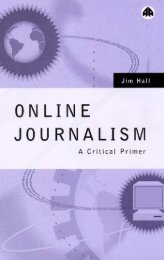Modul Mata Kuliah Journalisme Online - Ayo Menulis FISIP UAJY
Modul Mata Kuliah Journalisme Online - Ayo Menulis FISIP UAJY
Modul Mata Kuliah Journalisme Online - Ayo Menulis FISIP UAJY
Create successful ePaper yourself
Turn your PDF publications into a flip-book with our unique Google optimized e-Paper software.
Resist the temptation to respond in anger to those you regard as mistaken or ill-tempered<br />
Think about how you'd feel if your content was cited on the front page of a leading newspaper<br />
or website or blog as Reuters comment on an issue<br />
Don't suspend your critical faculties. It's simple to share a link on Twitter, Facebook and other<br />
networks but as a Reuters journalist if you repeat something that turns out to be a hoax, or<br />
suggests you support a particular line of argument, then you risk undermining your own<br />
credibility and that of Reuters News<br />
Avoid raising questions about your freedom from bias<br />
Your Facebook profile, Twitter stream or personal blog give clues to your political and other affiliations<br />
and you should take care about what you reveal. A determined critic can soon build up a picture of your<br />
preferences by analysing your links, those that you follow, your 'friends', blogroll and endless other<br />
indicators. We all leave an 'online footprint' whenever we use the Web and you need to think about<br />
whether your footprint might create perceptions of a bias toward or against a particular group.<br />
Think about the groups that you join -- it may be safest not to join a group or to follow<br />
participants on just one side of a debate<br />
Think about using 'badges' expressing solidarity with some cause<br />
Think about whether it would be best to leave your political affiliation out of your Facebook<br />
profile<br />
Think about whether you link only or mainly to voices on one side of a debate<br />
Think about making use of the privacy settings on social networks and basic ways in which you<br />
can conceal your use of the Web like clearing your cache regularly<br />
Be transparent<br />
We're in the transparency business and we encourage you to be open about who you are.<br />
On your personal blog or social networking profile make it clear that you are a Reuters journalist<br />
and that any opinions you express are your own.<br />
When you post comments do so under your real name<br />
If you use social networks for both professional and private activity then use separate accounts<br />
Many of you are using social networks like Facebook or Twitter both as part of your newsgathering and<br />
as part of your personal social networking. In the online world private and professional are increasingly<br />
intertwined but we do expect you to maintain a professional face at all times in your work for us and this<br />
extends to your use of social media. Put simply, we're expecting you to apply standards to your<br />
professional use of social media that will probably differ to those you would use for your personal<br />
activity. For this reason we recommend that you set up separate profiles for your professional and<br />
private activity. This is not to say that we recommend that you strip out all personal content from your<br />
professional streams, but that you should think carefully about what personal content would be<br />
appropriate.
















